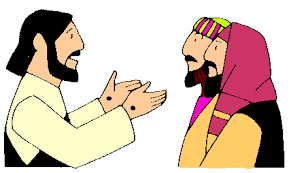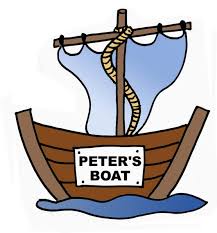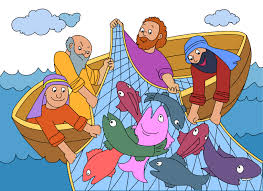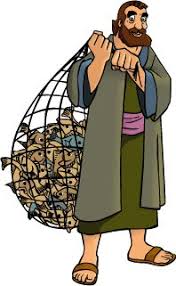John 21:1 – After this Jesus revealed himself again to the disciples by the Sea of Tiberias, and he revealed himself in this way.
In the final chapter of his gospel, John gives us additional infallible proofs that Jesus has risen from the dead.

At this point, all the disciples of Jesus are well aware that he has risen; they have seen and interacted with him themselves. Their eyewitness accounts give us faith to believe in the resurrection.
As this chapter opens, we find the disciples have left Jerusalem, the site of the crucifixion and resurrection. In some ways we might say that Jerusalem is now a forsaken city; it rejected Christ and now it is slated for destruction. That destruction would happen in 70 AD at the hands of Rome.
Although the Jews will face intense and terrible persecution there, God has not completely rejected his city or his people. He will preserve the Jewish nation and restore it to its homeland once again (1948 AD).
As you recall, the Sea of Tiberius is the same as the Sea of Galilee. This shows that the disciples have gone to Galilee, the place where they were told to meet the Lord (Mark 14:28, Matthew 26:32, Matthew 28:10). Galilee was a natural choice for the meeting; Jesus often ministered here and it is far away from the politics of Jerusalem. As far as we know, this account is the third time that Jesus has revealed himself to his disciples.
And of course, we find a lesson for ourselves in this verse. Jesus told the disciples where to meet him – in Galilee. He has also told us where to find him – in the place of prayer. He desires to reveal himself to us there, just as he revealed himself to the disciples in Galilee. If we want to fellowship with him, get to know him, and allow him to work in our lives, we must seek the place of prayer.
John 21:2 – Simon Peter, Thomas (called the Twin), Nathanael of Cana in Galilee, the sons of Zebedee, and two others of his disciples were together.
Here we find seven of the disciples 'together' in Galilee. The meaning is that they were residing together in the same place. While they were in Galilee, waiting for Jesus and the outpouring of Holy Spirit, they went back to work.

This was a logical thing to do. Remember, as long as they traveled with Jesus their needs were met by people who supported the ministry through donations (Luke 8:2-3). With Jesus gone, that source of income was gone. Because they had no idea how long they would need to wait for Holy Spirit to come, they had to find a means of support. Hence, they returned to fishing.
Notice that two of the disciples mentioned here are not identified by name. Many scholars suppose they were Philip and Andrew, but there is really no clear basis for this identification – it is purely a guess. The two 'other' disciples may have simply been followers of Jesus and not two of the apostles.
However, we can clear up any mystery about the apostle 'Nathanael' – we know him better as Bartholomew.
John 21:3 – Simon Peter said to them, "I am going fishing." They said to him, "We will go with you." They went out and got into the boat, but that night they caught nothing.
First, let us remind ourselves that these men are experienced fishermen. Not just recreational fishermen like many of us, but commercial fishermen – they had formerly gained all their living in this manner. Therefore, we can conclude that they have all the necessary equipment, skills and knowledge to be successful in their venture. We would expect them to succeed.
Yet, they labor all night long, without the least bit of success. They didn't catch even a single fish! How can this be?
There can be no doubt that God permitted the men to work all night long without the least bit of success, so that it would dramatically draw their attention to the miracle that was about to take place.
John 21:4-5 – Just as day was breaking, Jesus stood on the shore; yet the disciples did not know that it was Jesus. Jesus said to them, "Children, do you have any fish?" They answered him, "No."
How is it possible that the disciples did not recognize Jesus? We know it was very early in the morning (twilight) and because of the distance to shore, they could not clearly see him. Since they were not expecting to see Jesus, they probably thought he was a common person, looking to buy some fish.
One thing we should note here is the timing of the appearance of Christ. The disciples were at a point of hopelessness and possibly even despair. Nothing was going as they thought it would, and they had exhausted all their own earthly strength and knowledge. When they came to the end of their own strength, then Christ appeared to offer hope and assistance.
Jesus addresses his disciples with a term of endearment (children), which infers both friendship and affection. The greeting itself would not necessarily have revealed his identity because the word was commonly used by superiors offering a greeting to those of a lower station.
By asking them if they have any fish, he again draws attention to their true situation – they have nothing. Once again, this will make the upcoming miracle an astonishing event in their minds.
John 21:6 – He said to them, "Cast the net on the right side of the boat, and you will find some." So they cast it, and now they were not able to haul it in, because of the quantity of fish.
Does this situation seem at all familiar? It should! In Luke 5:1-11 we have an almost identical situation. Simon, along with James and John, had fished all night and caught absolutely nothing. They headed for shore and were washing out their nets when Jesus came and asked them to put him in their boat and push off from the shore, so he could teach the crowd.
When he had finished, he instructed Peter to launch out from the shore and let down his net. Peter was skeptical, but he did as Jesus instructed. He caught such a huge catch of fish that his net broke. He called for James and John to bring their boat and help him gather the fish. The catch was so enormous that they filled both ships until they began to sink!
At that point, Jesus told them to follow him, and he would make the fishers of men.
Matthew 4:19 - And he said unto them, Follow me, and I will make you fishers of men.
This scenario is now played out a second time.
Again, the disciples had fished all night with no results. This time, a man on shore whom they do not know instructs them to specifically cast their nets on the right side of the boat.
We really do not know what prompted them to obey him. Perhaps they remembered the command of Jesus from years before. Perhaps they were simply at a loss as to what else to do, after an exhausting and unfruitful night of work. In any case, they obeyed him. After all, what harm could it do? Maybe this stranger was acquainted with the lake and knew where the fish gathered, or maybe he could see a school of fish from his vantage point. What was one final casting of the net, in this long night of frustration? At least they would have the satisfaction of knowing they did all they could to succeed.
Immediately upon their obedience to his command, the miracle occurred.
 Their net was so completely full of fish, they were not able to haul it into the boat! In fact, they were barely able to drag it to shore. Of course, you and I know that the 'stranger' was Jesus!
Their net was so completely full of fish, they were not able to haul it into the boat! In fact, they were barely able to drag it to shore. Of course, you and I know that the 'stranger' was Jesus!This miracle shows the divinity of Jesus in two ways: The quantity of fish that were taken as well as the preservation of the net, which would ordinarily have broken under the strain.
The multitude of fish was intended as an example for the disciples – it represented the immense number of souls that would be 'caught' for Christ through their ministry (Matthew 4:19). The prophets had 'fished' for souls for years and years, but caught very little. However, things had now changed. As Holy Spirit worked through the disciples, 3000 souls would enter the kingdom of heaven on a single day (Acts 2:41)!
In addition, the miracle provided an ample supply of provision for the disciples to support themselves and their families as they waited in Jerusalem for the coming of Holy Spirit. Clearly, Jesus is revealing himself to the disciples as Jehovah Jireh – the provider of all of their needs.
Consider this: God is the author/fountain of every blessing to mankind; the immense quantity of fish in the net was an act of kindness and provision from God to the disciples.
In the same way, the money that we earn today is a result of the blessing of God. Scripture tells us that it is God who gives us the 'power' to get wealth:
Deuteronomy 8:18 -But you shall remember the LORD your God: for it is he that gives you power to get wealth, that he may establish his covenant which he swore unto your fathers, as it is this day.
This power includes things like intelligence, opportunities, creative ideas, health, strength, capital, connections and anything else that we need to succeed. Like the disciples, we must take this power and earn/work for the wealth we need.
When we reap the rewards of a job well done, we need to remember that our success cannot be solely attributed to our own labor; God has made it possible. Since that is the case, we should happily and gratefully bring our tithes and offerings into the house of God. Furthermore, because God has been generous towards us, we ought to freely and generously give to those in need.
John 21:7-8 – That disciple whom Jesus loved therefore said to Peter, "It is the Lord!" When Simon Peter heard that it was the Lord, he put on his outer garment, for he was stripped for work, and threw himself into the sea. The other disciples came in the boat, dragging the net full of fish, for they were not far from the land, but about a hundred yards off.
As we know, 'the disciple whom Jesus loved' was none other than the apostle John, the writer of this gospel. He realized Jesus was the man on the shore, but not because he could physically see him. His recognition was based on the miraculous catch of fish – John perceives that the great multitude of fish could only have come to him by the hand of God; therefore, it was God who guided his hands in obtaining it.
He shares this information with Peter, who reacts with his usual zealousness.
Peter (and probably the others as well) had been clothed only in his inner garment, which was his normal working attire. But immediately upon hearing the Lord was on shore, he puts on his outer garment and jumps into the water.

While some feel he swam for the shore, leaving his friends behind to bring in the fish, others believe that since the boat was fairly close to land (roughly 100 yards), his intent was to assist in quickly drawing the boat to shore. The latter explanation makes more sense because it would have been much more difficult to swim to shore wearing an outer garment.
In either case, we see that his actions are a reflection of his intense desire to be with Christ.
It is interesting to note how different each of the disciples were, both then and now. Some members of the church are contemplative, like John. They serve the church with their great gifts of knowledge and wisdom. Others (like Peter) are strong and active, making sure that things get done.
It is easy to see why the apostle Paul likens the church to a mortal body with different members such as ears, hands, shoulders, etc. Each and every member is vital to the health of the collective body of Christ (I Corinthians 12:12-31).
John 21:9 – When they got out on land, they saw a charcoal fire in place, with fish laid out on it, and bread.
Remember, the disciples have been up all night, working a very physical job. They are tired, hungry, wet and probably cold. When they get to shore with Jesus, they find that he is ready to minister to their bodily needs. He has prepared a warm fire and a hot meal.
This is an example of a truth that Jesus taught while he was physically on earth – our Father knows all that we have need of in this life Matthew (6:25-34), and he will provide it as we seek him first.
Matthew 6:32-33 -(For after all these things do the Gentiles seek:) for your heavenly Father knows that you have need of all these things. But seek you first the kingdom of God, and his righteousness; and all these things shall be added unto you.
Scholars are divided on the origin of the bread, fish and fire. The scriptures do not specifically indicate they were miraculously produced, although that is certainly possible. What do you think?
John 21:10-11 – Jesus said to them, "Bring some of the fish that you have just caught."So Simon Peter went aboard and hauled the net ashore, full of large fish, 153 of them. And although there were so many, the net was not torn.
Jesus asks the disciples to go back to the shore and bring him some of the fish they just caught. Why would he do that?
We can be sure it had nothing to do with a shortage. The scriptures tell us that Jesus fed 5000 men plus women and children with just five small loaves and two fish (Matthew 14:21). Jesus already had bread and fish cooking on the coals. Feeding seven disciples wasn't going to be a problem, no matter how much they ate.
The answer is that Jesus wanted them to taste the gifts of his miraculous bounty, so they could be witnesses of his power and goodness. The blessings he gives us are not to be hoarded for ourselves; as we have freely received we should freely give to others.
It also represents the partnership between Jesus and mankind. Jesus made us fishers of men, but we are only able to catch people in our gospel nets by the power and influence of Holy Spirit. Once we bring them to Christ, we still need his assistance to train and disciple them. Only Christ can complete the good work that he begins within the heart of every believer (Philippians 1:6).
Many mysterious and silly explanations have been given regarding the exact number of fish (153). None of them are supported in scripture. The number may simply have been recorded because the disciples counted the fish in order to divide them equally amongst themselves. Besides, if you landed the biggest catch of fish ever in your whole life, wouldn't you count them too, just out of curiosity?
Keep in mind, the miracle here is not the exact number of the fish, but the enormity of the catch and the preservation of the net.
John 21:12 – Jesus said to them, "Come and have breakfast." Now none of the disciples dared ask him, "Who are you?" They knew it was the Lord.
In asking the disciples to breakfast, Jesus is revealing his true nature to his followers. Specifically, he is both God and man.
The miracle of the fish proves his divinity. By eating breakfast with them, he proves his humanity – Jesus is not just an apparition or a spiritual figment of their imaginations.
This assures us that Jesus is our living high priest, our brother and our kinsmen redeemer, who now makes intercession for us in the throne room of God, while dwelling in our hearts through his Holy Spirit. He continues to be clothed in the body which once hung upon the cross in a pool of blood and gore, only now it is exalted and glorified, shining brighter than the sun.

Besides the proof of his nature, Jesus also invites his disciples to eat because he is concerned about their physical welfare. Our bodies are temples of his Holy Spirit and he provides what we need so that our bodies can be refreshed and in good working order!
One can't help but wonder if this is one of the reasons why the gift of healing was included in the sacrifice of the cross.
John seems to make a big deal out of the fact that none of the disciples 'asked' Jesus who he was. It was not that they did not recognize him; they were all well aware that it was Jesus sitting with them at breakfast.
The Greek word translated 'ask' means 'to prove or inquire'. John's point seems to be that a proper awe of the deity of Christ had settled on their hearts and minds and as a result, they approached him in reverent silence. Asking him for any further kind of proof would be to display unbelief and hardness of heart, and they certainly didn't want that!
John 21:13-14 – Jesus came and took the bread and gave it to them, and so with the fish. This was now the third time that Jesus was revealed to the disciples after he was raised from the dead.
When John references the 'third time' Jesus appeared, he means the third time Jesus appeared to the disciples collectively. Since John is giving us his own personal account/witness in his gospel, he skips over the instances where he was not personally present. These would include Jesus' visitation of Mary as well as well as the two disciples on the road to Emmaus and others.
John does not specifically say that Jesus ate breakfast with them, but it is certainly implied in the context. Besides, in the book of Acts, Peter specifically tells the Gentile Cornelius that the disciples both ate and drank with Jesus after his resurrection. This is one of the infallible proofs that Jesus provided to show that he was alive after the crucifixion (Acts 10:41).
Let me offer you some encouragement:
In today's post we talked about the disciples meeting with Jesus in Galilee. Let's stop and consider this for a moment.
Under the Old Testament law, NO ONE could come into the presence of God except the high priest, and he could only do so once a year. Fellowship with God was not possible because of our sin. Think of the millions and millions of people who lived during that era – they had zero access to the presence of God.
When Jesus came to earth, his disciples (especially the twelve) were able to fellowship with him on a limited basis, but he was only one person and he still had to eat, sleep and teach. Plus, access to Jesus continued to be almost nonexistent for everyone else (especially the Gentiles).
But now that Jesus has risen and he abides in heaven, you and I have UNLIMITED access to the throne room of God 24/7! What a privilege to be able to meet/fellowship with the God of the universe at any time, in any place, regarding anything on your heart and mind!
If you still think of prayer as an obligation, I encourage you to think again – the opportunity to meet with Jesus is a priceless gift!
Let me offer you some relief:
Several of the disciples went back to their fishing boats in order to provide for the daily needs of themselves and their families. They toiled without success until Jesus came into the picture, bringing them relief. But keep in mind, the relief came in the form of work – they still had to cast the net, catch the fish, drag them to shore and eventually sell them.
The bible assures us that God knows what our needs are, and he is here to assist us. However, it is very unlikely that he is going to make money grow on a tree in your backyard. Rather, he will open doors of opportunity for you to work/earn what you need. So, if you are praying for relief in your finances, be aware that most likely something will be required on your part – God isn't going to do your work for you!
Let me offer you some strength:
The period of time between Jesus' the resurrection and his ascension to heaven was an unusual one. The disciples encountered Jesus at different times and in different ways.
Jesus was furnishing them with proof, after proof, after proof of his resurrection, so that they could spread the gospel message with confidence. Overall, we could say that Jesus was preparing them for their future role as his apostles.
What is Jesus doing in your life right now? Have you considered the fact that whatever you are going through right now is training for a future ministry or good work that he has prepared for you to do?
Remember, if you are still on this planet, then God still has plans and purposes for your life. So stay strong in your faith, and keep an eye out for new opportunities to serve the Lord!
